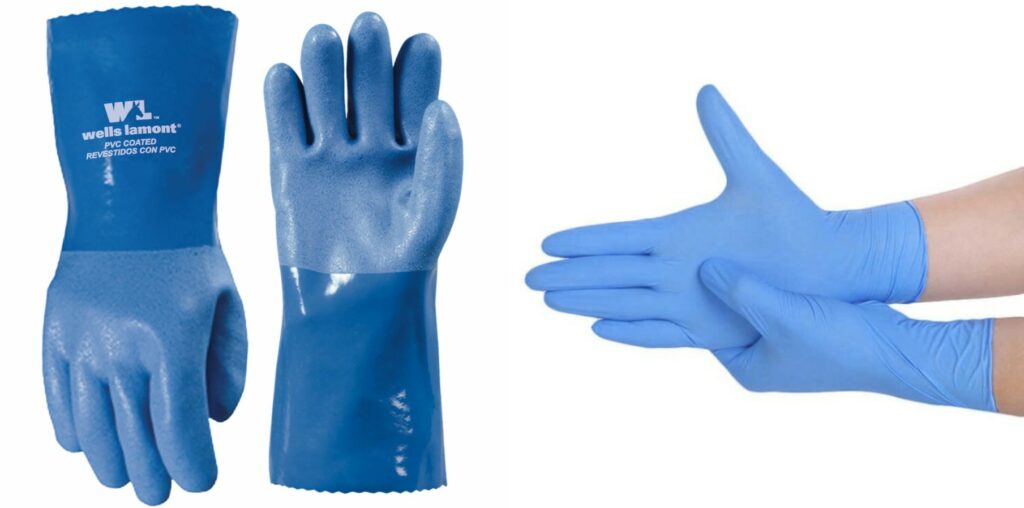When it comes to PPE protection, the importance of gloves cannot be ignored. The most commonly used gloves are PVC gloves and Vinyl gloves. But, the question is are PVC gloves and Vinyl gloves the same?
Although used as separate terms, you might be surprised to know that PVC gloves and Vinyl gloves are the same. The terms are used interchangeably. The material is the same.
PVC gloves, also known as Vinyl gloves, are the most popular choices when it comes to the healthcare industry, laboratories, and the food processing industry. However, the use of these gloves has recently started raising safety concerns.
If you use PVC/Vinyl gloves frequently as a health worker, a sanitation worker, or somebody handling food items, this will be an eye-opening guide.

PVC Gloves And Vinyl Gloves: Are They Different?
PVC gloves and Vinyl gloves are the same things. They’re basically manufactured using raw synthetic plastics. In fact, if you look at the full form of PVC, it’s Poly Vinyl Chloride.
The primary reason that PVC/Vinyl gloves are so popular is that they’re extremely affordable when purchased in bulk. And in all honesty, when purchased by medical centers or food industries, they’re purchased in bulk. So, they’re cost-effective options.
Another benefit of PVC/Vinyl gloves is that Latex can sometimes cause allergies when worn for long. Many people have latex allergies.
Advantages of PVC Gloves: Why Are They Popular Options?
We’ve already mentioned that affordability is one of the biggest advantages of Vinyl gloves. However, that’s not all – there are other benefits too that we’ve listed below.
Have a look at the pointers below for complete information on the advantages of PVC Gloves.
1.) Longer shelf life is an obvious advantage. When purchased in bulk, the plasticizers in Vinyl gloves don’t let the gloves go weak.
2.) Since they’re synthesized, they can be made in many thicknesses. Besides, there’s always an option to manufacture powdered and powder-free PVC gloves.
3.) There’s nothing better than Vinyl gloves when it comes to the disposal of non-hazardous waste.
4.) Sometimes, latex gloves cause skin allergies. PVC gloves are the alternatives for people with latex allergies. Though Nitrile gloves are the most amazing replacements for people who are allergic to latex, but, nitrile gloves are expensive.
Why are PVC Gloves Raising Safety Alarms?
It’s a natural human inclination to go for more affordable options. Protective PPE is no different. However, amid the onset of the pandemic, there are some red flags that PVC/Vinyl gloves have started raising. Those risks cannot be ignored.
Just so that you can make a conscious informed decision on whether or not you want to use PVC gloves, the upcoming sections are quite relevant.
Quick Fact: Did you know that some countries, including Japan and China, have banned the use of PVC gloves in the food industry? It’s the high concetration of chlorine in Vinyl gloves that raises health concerns in PVC gloves!
Have a look at the disadvantages before making a final call on whether or not you’d like to use PVC gloves or replace them with other options.
1.) The Presence of Phthalates
This is one of the major red flags that PVC gloves aren’t safe options in the food industry. Phthalates get absorbed in the food when the handler is wearing PVC gloves.
Naturally, people who consume the very same food end up ingesting phthalates. You might not know, but phthalates are highly carcinogenic.
That’s why many countries have banned using PVC gloves in the food industry. PVC-free gloves are used as the safer option.
2.) Release of Dioxins
PVC gloves are made of plastic – they’re obviously not biodegradable. This is why, at times, people/industries trying to dispose of these gloves end up burning them.
Burning PVC releases dioxins. Dioxins are carcinogenic again. When inhaled, they put the handlers at risk of developing cancers.
So, safely disposing of Vinyl is a very real environmental challenge since burning Vinyl isn’t safe at all.
Did you know that it’s Germany that has actually banned the disposal of PVC gloves entirely in landfills? In fact, no less than 60 cities in Spain are already entirely PVC-free?
3.) Risks in Healthcare
The majority of hospitals in the US that include providing healthcare to children have limited the use of Phthalates in Vinyl gloves due to the risks involved. PVC has been marked as a major threat in healthcare by the FDA.
Vinyl/PVC gloves cannot filter bacteria and Viruses largely. That’s why Nitrile and Latex are the more preferred options in laboratories where workers deal with Viruses and bacteria day in and day out.
So, Are PVC Gloves the Villains That Shouldn’t be Used at All?
No, not at all. Everything comes with advantages and disadvantages. All that’s needed is to identify which areas are safe to use PVC gloves and how to dispose of them safely.
There are Vinyl variations that have very little amounts of chlorine and phthalates.
Here’s how you can use PVC gloves safely:
1.) PVC gloves are good options for workers handling non-hazardous substances.
2.) Don’t use them if you’re a surgeon or a chef.
3.) Use a fold-disc to ensure proper fitting when wearing PVC gloves.
3 Safe Gloves That You Can Use Instead
There are unpowered PVC gloves that can be used. However, if you’re specifically working in the food industry or the medical sector, you should use the following gloves instead since it’s human health that’s at maximum stake in these industries.
1.) FineTough Nitrile Gloves by Eagle Protect
- THE EAGLE PROTECT FINETOUGH GLOVES: Excellent hand and personal protection. Strong and Lightweight for those that need ultimate tactile sensitivity and precision work.
- ENVIRONMENTAL ADVANTAGES: Packed 200 gloves per box or 2000 per case, FineTough Gloves are lightweight and uses less raw materials, making it the superior choice for those seeking a more economical choice, while reducing waste, making it a better choice for the environment.
- POWDER- & LATEX-FREE: Powder-free gloves leave no residue, reducing the risk of contamination. Latex-free gloves help to prevent allergic reactions to latex protein.
Prices pulled from the Amazon Product Advertising API on:
Product prices and availability are accurate as of the date/time indicated and are subject to change. Any price and availability information displayed on [relevant Amazon Site(s), as applicable] at the time of purchase will apply to the purchase of this product.
These are extremely safe food-grade nitrile gloves that are FDA-compliant. Since they are non-bulky, they do not hamper the performance of workers either.
Many other benefits of using these gloves are listed below:
1.) Not only FDA, but these gloves are also approved by ASTM, EN ISO, and HACCP.
2.) Since they’re powder-free, they’re 100% safe when handling food.
3.) They do not have even slight traces of Latex protein. Hence, they’re the best options for people with Latex allergies.
4.) The fingertips are fully textured. Hence, a strong grip is one of the better advantages of these gloves.
Check Price and Reviews on Amazon2.) Nitrile Disposable Gloves Powder Free By Wostar
- Disposable nitrile gloves Durable, comfortable-sturdy, high-quality nitrile material can provide incredible stretching force without tearing or shrinking.
- Take care of your hands-Nitrile gloves keep your hands away from liquids, oils, synovial fluid, gas and sharp objects. People who are allergic to latex gloves are a good choice.
- Silicon-free, with certain antistatic properties, suitable for the production needs of the electronics industry.Nitrile Gloves Suitable for the second skin 4mil powder free extra glove excellent touch has a bare hand feel and is friendly !
Prices pulled from the Amazon Product Advertising API on:
Product prices and availability are accurate as of the date/time indicated and are subject to change. Any price and availability information displayed on [relevant Amazon Site(s), as applicable] at the time of purchase will apply to the purchase of this product.
These highly stretchable nitrile gloves are highly resilient to wear and tear while you’re working. They’re excellent protection against oils, contaminated surfaces, sharp objects, and synovial fluids.
1.) They’re entirely free of silicone.
2.) They’re excellent choices for people working in labs and the healthcare sector in general.
3.) They’re tight but not too tight. Naturally, they won’t restrict the blood flow.
Check Price and Reviews on Amazon3.) Nitrile Examination Gloves by Defender Safety
- Defender Safety Nitrile Examination Gloves are medical grade and are trusted by millions across the US
- Meets ASTM D6319 standard provding Incredible tensile strength and elongation, with high durability and puncture resistance.
Prices pulled from the Amazon Product Advertising API on:
Product prices and availability are accurate as of the date/time indicated and are subject to change. Any price and availability information displayed on [relevant Amazon Site(s), as applicable] at the time of purchase will apply to the purchase of this product.
These are medical-grade gloves approved and certified by the ASTM. They offer excellent resilience to punctures. They offer snug-fitting as well. Some other very important benefits of these gloves are as follows:
1.) Since they’re ambidextrous, no matter which one is your working hand, these gloves will fit your hands properly.
2.) The beaded cuffs make them resistant to slipping while wearing them or taking them off.
3.) The fingertips are properly pitted. So, no matter which examination medical instrument you’re holding, they won’t fall.
4.) They’re also very safe options for the food industry.
Check Price and Reviews on AmazonConcluding Thoughts:
PVC gloves and Vinyl gloves are the same things. There are some advantages of PVC gloves and some disadvantages too.
Vinyl gloves are the most economical disposal gloves. Despite the negatives, when used properly, these gloves are still a great option.
Many countries have restricted the use of vinyl gloves in the food handling and healthcare industry because of the presence of phthalates and chlorine.
As long as you do not use PVC gloves in the above-said industries and use them to handle non-hazardous substances, they are quite beneficial.
Disposing of PVC/Vinyl gloves by burning them is another problem because if you burn them, dioxins are released, and dioxins are carcinogenic elements.
These are some of the reasons that using PVC/Vinyl gloves comes with a lot of responsibility.










